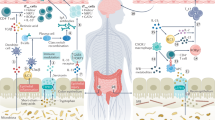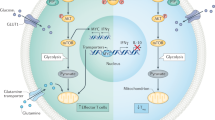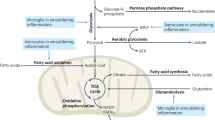Abstract
Clinical and experimental data, together with epidemiological studies, have suggested that the pathogenesis of multiple sclerosis (MS) might involve factors that link the immune system with metabolic status. Moreover, recent research has shown that leptin, the adipocyte-derived hormone that controls food intake and metabolism, can promote experimental autoimmune encephalomyelitis, an animal model of MS. In patients with MS, the association of leptin with disease activity has been dissected at the molecular level, providing new mechanistic explanations for the role of this hormone in MS. Here, we review the intricate relationship between leptin and other metabolic modulators within a framework that incorporates the latest advances linking the CNS, immune tolerance and metabolic status. We also consider the translational implications of these new findings for improved management of MS.
Key Points
-
Leptin is an adipocyte-derived hormone that is secreted proportionally to adipose tissue mass and inhibits food intake
-
Leptin links the immune response to metabolism and nutritional status
-
Leptin promotes proinflammatory immune responses and inhibits the proliferation of anti-inflammatory regulatory T cells
-
Orexigenic mediators antagonize the anorexigenic and proinflammatory effects of leptin in experimental autoimmune encephalomyelitis (EAE), an animal model of multiple sclerosis (MS)
-
Drugs that affect metabolism are effective at reducing the proinflammatory effects of leptin in EAE
-
Given the beneficial effects of leptin blockade on EAE outcome, leptin could represent an attractive target to reduce autoimmune inflammation in MS
This is a preview of subscription content, access via your institution
Access options
Subscribe to this journal
Receive 12 print issues and online access
$209.00 per year
only $17.42 per issue
Buy this article
- Purchase on Springer Link
- Instant access to full article PDF
Prices may be subject to local taxes which are calculated during checkout


Similar content being viewed by others
References
Ahima, R. S. & Flier, J. S. Leptin. Annu. Rev. Physiol. 62, 413–437 (2000).
La Cava, A. & Matarese, G. The weight of leptin in immunity. Nat. Rev. Immunol. 4, 371–379 (2004).
O'Neill, L. A role for leptin in autoimmunity? Trends Immunol. 22, 352 (2001).
Matarese, G. & La Cava, A. The intricate interface between immune system and metabolism. Trends Immunol. 25, 193–200 (2004).
Steinman, L. A molecular trio in relapse and remission in multiple sclerosis. Nat. Rev. Immunol. 9, 440–447 (2009).
Matarese, G. et al. Balancing susceptibility to infection and autoimmunity: a role for leptin? Trends Immunol. 23, 182–187 (2002).
De Rosa, V. et al. A key role of leptin in the control of regulatory T cell proliferation. Immunity 26, 241–255 (2007).
Sánchez-Margalet, V. et al. Role of leptin as an immunomodulator of blood mononuclear cells: mechanisms of action. Clin. Exp. Immunol. 133, 11–19 (2003).
Hekerman, P. et al. Pleiotropy of leptin receptor signalling is defined by distinct roles of the intracellular tyrosines. FEBS J. 272, 109–119 (2005).
Chan, J. L. et al. Differential regulation of metabolic, neuroendocrine, and immune function by leptin in humans. Proc. Natl Acad. Sci. USA 103, 8481–8486 (2006).
Sanna, V. et al. Leptin surge precedes onset of autoimmune encephalomyelitis and correlates with development of pathogenic T cell responses. J. Clin. Invest. 111, 241–250 (2003).
Howard, J. K. et al. Leptin protects mice from starvation-induced lymphoid atrophy and increases thymic cellularity in ob/ob mice. J. Clin. Invest. 104, 1051–1059 (1999).
Matarese, G. et al. Requirement for leptin in the induction and progression of autoimmune encephalomyelitis. J. Immunol. 166, 5909–5916 (2001).
Sarraf, P. et al. Multiple cytokines and acute inflammation raise mouse leptin levels: potential role in inflammatory anorexia. J. Exp. Med. 185, 171–175 (1997).
Lock, C. et al. Gene-microarray analysis of multiple sclerosis lesions yields new targets validated in autoimmune encephalomyelitis. Nat. Med. 8, 500–508 (2002).
Matarese, G. et al. Leptin increase in multiple sclerosis associates with reduced number of CD4+CD25+ regulatory T cells. Proc. Natl Acad. Sci. USA 102, 5150–5155 (2005).
De Rosa, V. et al. Leptin neutralization interferes with pathogenic T cell autoreactivity in autoimmune encephalomyelitis. J. Clin. Invest. 116, 447–455 (2006).
Farooqi, I. S. et al. Beneficial effects of leptin on obesity, T cell hyporesponsiveness, and neuroendocrine/metabolic dysfunction of human congenital leptin deficiency. J. Clin. Invest. 110, 1093–1103 (2002).
Härle, P. & Straub, R. H. Leptin is a link between adipose tissue and inflammation. Ann. NY Acad. Sci. 1069, 454–462 (2006).
Frisullo, G. The effect of disease activity on leptin, leptin receptor and suppressor of cytokine signalling-3 expression in relapsing–remitting multiple sclerosis. J. Neuroimmunol. 192, 174–183 (2007).
Munger, K. L., Chitnis, T. & Ascherio, A. Body size and risk of MS in two cohorts of US women. Neurology 73, 1543–1550 (2009).
Gomez, R., Lago, F., Gomez-Reino, J., Dieguez, C. & Gualillo, O. Adipokines in the skeleton: influence on cartilage function and joint degenerative diseases. J. Mol. Endocrinol. 43, 11–18 (2009).
Lago, F., Dieguez, C., Gómez-Reino, J. & Gualillo, O. Adipokines as emerging mediators of immune response and inflammation. Nat. Clin. Pract. Rheumatol. 3, 716–724 (2007).
Taleb, S. et al. Defective leptin/leptin receptor signaling improves regulatory T cell immune response and protects mice from atherosclerosis. Arterioscler. Thromb. Vasc. Biol. 27, 2691–2698 (2007).
Dixit, V. D. et al. Ghrelin inhibits leptin- and activation-induced proinflammatory cytokine expression by human monocytes and T cells. J. Clin. Invest. 114, 57–66 (2004).
Theil, M. M. et al. Suppression of experimental autoimmune encephalomyelitis by ghrelin. J. Immunol. 183, 2859–2866 (2009).
Bedoui, S. et al. Neuropeptide Y (NPY) suppresses experimental autoimmune encephalomyelitis: NPY1 receptor-specific inhibition of autoreactive Th1 responses in vivo. J. Immunol. 171, 3451–3458 (2003).
Malfitano, A. M. et al. Arvanil inhibits T lymphocyte activation and ameliorates autoimmune encephalomyelitis. J. Neuroimmunol. 171, 110–119 (2006).
Piccio, L., Stark, J. L. & Cross, A. H. Chronic calorie restriction attenuates experimental autoimmune encephalomyelitis. J. Leukoc. Biol. 84, 940–948 (2008).
Longo, V. D. & Fontana, L. Calorie restriction and cancer prevention: metabolic and molecular mechanisms. Trends Pharmacol. Sci. 31, 89–98 (2010).
Esquifino, A. I., Cano, P., Jimenez, V., Cutrera, R. A. & Cardinali, D. P. Experimental allergic encephalomyelitis in male Lewis rats subjected to calorie restriction. J. Physiol. Biochem. 60, 245–252 (2004).
Esquifino, A. I., Cano, P., Jimenez-Ortega, V., Fernandez-Mateos, M. P. & Cardinali, D. P. Immune response after experimental allergic encephalomyelitis in rats subjected to calorie restriction. J. Neuroinflammation 4, 6 (2007).
Hewson, D. C. Is there a role for gluten-free diets in multiple sclerosis? Hum. Nutr. Appl. Nutr. 38, 417–420 (1984).
Swank, R. L. & Dugan, B. B. Effect of low saturated fat diet in early and late cases of multiple sclerosis. Lancet 336, 37–39 (1990).
Nath, N. et al. Metformin attenuated the autoimmune disease of the central nervous system in animal models of multiple sclerosis. J. Immunol. 182, 8005–8014 (2009).
Diab, A. et al. Peroxisome proliferator-activated receptor-γ agonist 15-deoxy-Δ12,14-prostaglandin J2 ameliorates experimental autoimmune encephalomyelitis. J. Immunol. 168, 2508–2515 (2002).
Youssef, S. et al. The HMG-CoA reductase inhibitor, atorvastatin, promotes a Th2 bias and reverses paralysis in central nervous system autoimmune disease. Nature 420, 78–84 (2002).
Heneka, M. T., Landreth, G. E. & Hüll, M. Drug insight: effects mediated by peroxisome proliferator-activated receptor-γ in CNS disorders. Nat. Clin. Pract. Neurol. 3, 496–504 (2007).
Zhang, X. & Markovic-Plese, S. Statins' immunomodulatory potential against Th17 cell-mediated autoimmune response. Immunol. Res. 41, 165–174 (2008).
Udagawa, J. et al. The role of leptin in the development of the cerebral cortex in mouse embryos. Endocrinology 147, 647–658 (2006).
Valerio, A. et al. Leptin increases axonal growth cone size in developing mouse cortical neurons by convergent signals inactivating glycogen synthase kinase-3β. J. Biol. Chem. 281, 12950–12958 (2006).
Ahima, R. S., Bjorbaek, C., Osei, S. & Flier, J. S. Regulation of neuronal and glial proteins by leptin: implications for brain development. Endocrinology 140, 2755–2762 (1999).
Levine, J. M., Reynolds, R. & Fawcett, J. W. The oligodendrocyte precursor cell in health and disease. Trends Neurosci. 24, 39–47 (2001).
Steinman, L., Conlon, P., Maki, R. & Foster, A. The intricate interplay among body weight, stress, and the immune response to friend or foe. J. Clin. Invest. 111, 183–185 (2003).
Kuchroo, V. K. & Nicholson, L. B. Fast and feel good? Nature 422, 27–28 (2003).
Gao, Q. & Horvath, T. L. Neurobiology of feeding and energy expenditure. Annu. Rev. Neurosci. 30, 367–398 (2007).
Acknowledgements
G. Matarese is supported by grants from the European Union Ideas Program, ERC-Starting Independent Grant 'LeptinMS' project number 202579 and Telethon-JDRF Grant project number GJT08004. A. La Cava is supported in part by NIH grant AR53239. The authors thank Salvatore De Simone and Francesco D'Agnello for art graphics and the models in the figure. This work is dedicated to the memory of Eugenia Papa and Serafino Zappacosta.
Author information
Authors and Affiliations
Corresponding author
Ethics declarations
Competing interests
The authors declare no competing financial interests.
Rights and permissions
About this article
Cite this article
Matarese, G., Carrieri, P., Montella, S. et al. Leptin as a metabolic link to multiple sclerosis. Nat Rev Neurol 6, 455–461 (2010). https://doi.org/10.1038/nrneurol.2010.89
Published:
Issue Date:
DOI: https://doi.org/10.1038/nrneurol.2010.89
This article is cited by
-
Musical therapy attenuates neuroma pain by modifying leptin expression
BMC Complementary Medicine and Therapies (2022)
-
Leptin: an unappreciated key player in SLE
Clinical Rheumatology (2020)
-
The role of puberty and adolescence in the pathobiology of pediatric multiple sclerosis
Multiple Sclerosis and Demyelinating Disorders (2018)
-
Insights into the Mechanisms That May Clarify Obesity as a Risk Factor for Multiple Sclerosis
Current Neurology and Neuroscience Reports (2018)
-
Interactions between genetic, lifestyle and environmental risk factors for multiple sclerosis
Nature Reviews Neurology (2017)



